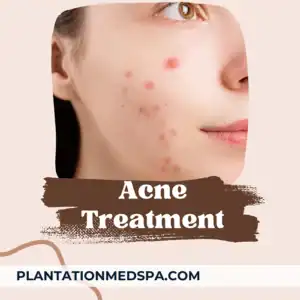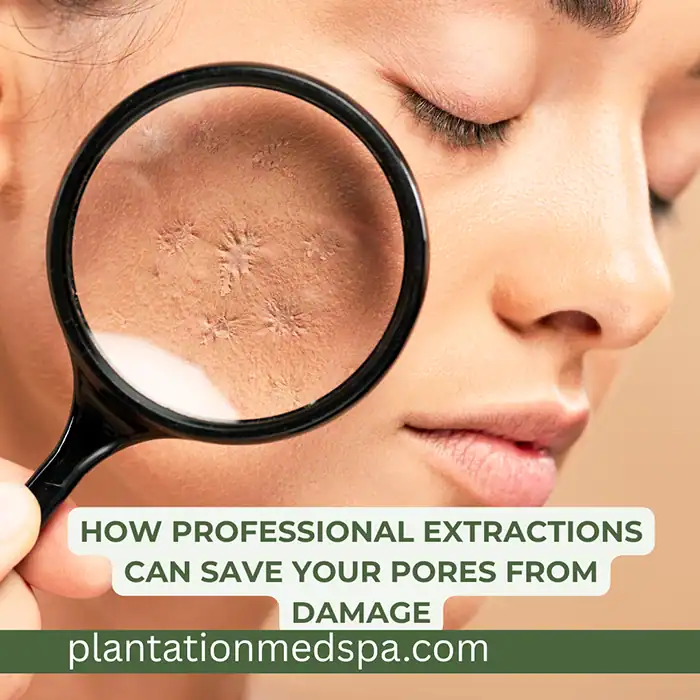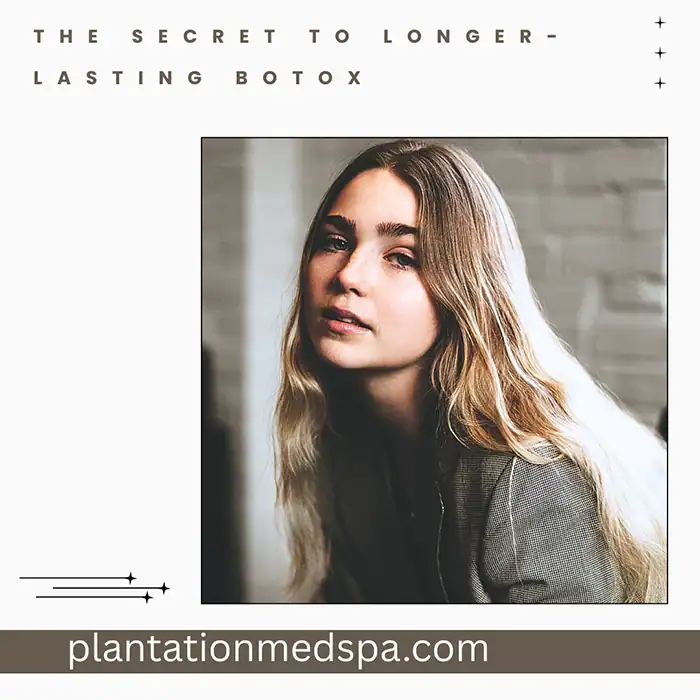Naturally transitions into your HydraFacial with Antifungal Boost or Customized Acne Corrective Treatments
Table of Contents
1. Understanding Acne: Causes, Types, and Treatments
2. Is It Fungal? 3 Signs Your ‘Acne’ Is Yeast Overgrowth
3. Why Plantation’s Humidity Makes Fungal Acne Worse
4. How Our Med Spa Treats Fungal Acne Differently
5. Over-the-Counter vs. Prescription Acne Treatments
6. Professional Treatments: Chemical Peels, Laser Therapy, and More
7. Managing Acne Through Lifestyle Changes
8. The Role of Hormonal Changes and Genetics in Acne
9. Acne Treatment for Teens: Special Considerations
10. Importance of Individualized Treatment Plans
11. Laser Therapy: Benefits and Considerations
12. Chemical Peels: How They Help with Acne
13. Micro-Needling: Stimulating Collagen for Clearer Skin
14. Regular Cleansing and Avoiding Irritants
15. Sun Protection and Its Role in Acne Management
16. Frequently Asked Questions (FAQs)
17. Conclusion
18. References
1. Understanding Acne: Causes, Types, and Treatments
Acne is a prevalent skin condition characterized by pimples, blackheads, and whiteheads resulting from clogged hair follicles beneath the skin. This article is about the hidden cause of stubborn bumps, and how our med spa treatments finally fix it.
Commonly affecting the face, neck, chest, and back, it’s most frequent among teenagers and young adults. While not life-threatening, acne can lead to scarring and emotional distress.
Treatment typically involves a combination of topical medications like benzoyl peroxide and salicylic acid for mild to moderate cases and oral antibiotics or isotretinoin for more severe instances. In-office procedures such as laser therapy or chemical peels can also improve skin texture and reduce scarring.
Consulting a dermatologist is crucial for an accurate diagnosis and to develop an individualized treatment plan that considers the severity and type of acne, your overall health and skin type.
2. Is It Fungal? 3 Signs Your ‘Acne’ Is Yeast Overgrowth
Not all acne is bacterial; some cases are due to yeast overgrowth, known as fungal acne or Malassezia folliculitis. This condition often presents as itchy, uniform red bumps, particularly on the chest, back, and shoulders.
Traditional acne treatments may not be effective against fungal acne and can sometimes worsen the condition. Key indicators include itchiness, clusters of small, uniform bumps, and a lack of response to standard acne medications.
If you suspect your acne might be fungal, it’s essential to consult a dermatologist for accurate diagnosis and appropriate antifungal treatments.
3. Why Plantation’s Humidity Makes Fungal Acne Worse
Plantation, FL, is known for its high humidity levels, creating an ideal environment for yeast to thrive on the skin. Excessive sweating and moisture can disrupt the skin’s balance, leading to fungal overgrowth.
Wearing tight clothing and not showering promptly after sweating can exacerbate the issue. The combination of heat and humidity makes keeping the skin dry and free from yeast proliferation challenging.
Implementing proper skincare routines and seeking treatments addressing fungal acne is vital in such climates.
4. How Our Med Spa Treats Fungal Acne Differently
At our Plantation Med Spa, we offer specialized treatments targeting fungal acne. Our HydraFacial treatments incorporate antifungal serums that cleanse and hydrate the skin while combating yeast overgrowth.
We also provide medical-grade chemical peels designed to rebalance the skin’s microbiome, reducing the likelihood of fungal proliferation. These treatments are tailored to your skin type and the severity of your condition.
Our comprehensive approach ensures that we address the root cause of your acne, providing long-term relief and clearer skin.
5. Over-the-Counter vs. Prescription Acne Treatments
Over-the-counter (OTC) acne treatments, such as benzoyl peroxide and salicylic acid, are effective for mild cases by targeting bacteria and exfoliating the skin. However, they may not suffice for more severe or persistent acne.
Prescription medications offer more potent solutions, including topical retinoids and oral antibiotics. Isotretinoin, a potent oral retinoid, is reserved for severe cystic acne and is unresponsive to other treatments.
A dermatologist can determine the most appropriate treatment based on your condition, ensuring optimal results.
6. Professional Treatments: Chemical Peels, Laser Therapy, and More
Professional treatments offer advanced solutions for acne management. Chemical peels exfoliate the skin, unclog pores, and reduce inflammation, improving overall skin texture.
Laser therapy targets acne-causing bacteria and reduces oil production, leading to fewer breakouts. These treatments also help diminish acne scars and hyperpigmentation.
Combining these procedures with a personalized skincare regimen enhances their effectiveness, leading to clearer, healthier skin.
7. Managing Acne Through Lifestyle Changes
Lifestyle factors significantly impact acne development and severity. Maintaining a balanced diet of fruits, vegetables, and whole grains can improve skin health.
Regular exercise helps reduce stress, a known acne trigger, but cleaning the skin promptly after sweating is essential. Adequate sleep and hydration are crucial in skin regeneration and toxin elimination.
These healthy habits can complement medical treatments and contribute to long-term acne management.
8. The Role of Hormonal Changes and Genetics in Acne
Hormonal fluctuations, particularly during puberty, menstruation, or pregnancy, can stimulate excess oil production, leading to acne. Conditions like polycystic ovary syndrome (PCOS) also contribute to hormonal acne.
Genetics play a role; if your parents had acne, you’re more likely to experience it. Understanding these factors helps in developing targeted treatment plans.
Hormonal therapies, such as oral contraceptives or anti-androgens, may be prescribed to regulate hormone levels and reduce acne.
9. Acne Treatment for Teens: Special Considerations
Teenagers often face unique challenges with acne due to hormonal changes during puberty. It’s essential to approach treatment sensitively, considering both physical and emotional impacts.
Gentle skincare routines using non-comedogenic products can prevent pore clogging. Topical treatments like benzoyl peroxide or salicylic acid are commonly recommended.
A dermatologist may prescribe medications or suggest in-office procedures to manage acne effectively in more severe cases.
10. Importance of Individualized Treatment Plans
Acne varies significantly among individuals, necessitating personalized treatment plans. Factors like skin type, acne severity, lifestyle, and underlying health conditions influence treatment choices.
A dermatologist will assess these aspects to develop a comprehensive plan, potentially combining topical and oral medications with professional procedures.
Regular follow-ups allow for adjustments, ensuring the treatment remains effective and responsive to your skin’s needs.
11. Laser Therapy: Benefits and Considerations
Laser therapy offers a non-invasive option for treating acne and its scars. It targets sebaceous glands to reduce oil production and destroy acne-causing bacteria.
Additionally, laser treatments stimulate collagen production, improving skin texture and reducing scarring. Multiple sessions may be required for optimal results.
Consultation with a qualified professional is essential to determine suitability and to discuss potential side effects.
12. Chemical Peels: How They Help with Acne
Chemical peels involve applying a solution to exfoliate the skin, removing dead cells and unclogging pores. They can reduce acne lesions, diminish scars, and improve skin tone.
Different peels, such as glycolic acid or salicylic acid peels, cater to various skin types and concerns. A dermatologist can recommend the most appropriate peel based on your skin’s condition.
Regular treatments can lead to significant improvements in skin clarity and texture.
13. Micro-Needling: Stimulating Collagen for Clearer Skin
Micro-needling involves using fine needles to create micro-injuries in the skin, stimulating collagen and elastin production. This process helps reduce acne scars and improves overall skin texture.
The procedure enhances the skin’s ability to absorb topical treatments, increasing their effectiveness. It’s minimally invasive with a short recovery time.
Multiple sessions may be necessary to achieve desired results, and it’s essential to have the procedure performed by trained professionals.
14. Regular Cleansing and Avoiding Irritants
Consistent cleansing is crucial in any acne treatment regimen.
Washing your face twice daily with a mild, non-abrasive cleanser helps remove excess oil, dirt, and bacteria contributing to acne. It’s essential to cleanse after sweating, as sweat can mix with oil and clog pores.
Avoiding irritants is equally essential. Oily or greasy cosmetics, certain sunscreens, and hair products can worsen acne by clogging pores or causing allergic reactions.
Always choose non-comedogenic, fragrance-free products specifically designed for acne-prone skin.
In addition to avoiding irritating skincare products, steer clear of aggressive scrubbing, which can damage your skin’s protective barrier. Gentle care helps maintain the skin’s natural balance, supports healing, and minimizes inflammation.
15. Sun Protection and Its Role in Acne Management
Sun exposure may temporarily dry out pimples, but it worsens acne long-term by causing skin damage, dehydration, and increased oil production. UV rays can also darken acne scars, making post-inflammatory hyperpigmentation more noticeable and challenging to treat.
Using a broad-spectrum sunscreen with SPF 30 or higher every day is essential. Opt for a formula labeled “oil-free” and “non-comedogenic” to avoid pore clogging.
Mineral sunscreens with zinc oxide or titanium dioxide are ideal for sensitive or acne-prone skin.
Consistent sun protection not only shields your skin from harmful UV rays but also supports the effectiveness of acne treatments. Some medications and procedures make your skin more sun-sensitive, so proper sunscreen use is non-negotiable.
16. Frequently Asked Questions (FAQs) About Acne Treatment in Plantation, FL
Q1. What treatment is best for acne?
Concise Answer: The best treatment depends on the type and severity of acne.
Detailed Answer: Mild acne often responds well to topical solutions like benzoyl peroxide or salicylic acid. More severe acne may require prescription medications such as retinoids or antibiotics.
Cystic acne might need isotretinoin or hormonal treatments. In-office procedures like chemical peels, laser therapy, or HydraFacials at med spas can offer faster, more visible results for resistant cases.
Q2. Which skin treatment is best for acne?
Concise Answer: Chemical peels and laser therapy are among the most effective skin treatments.
Detailed Answer: While topical products work well for everyday care, skin treatments like salicylic acid peels, microneedling, and blue light therapy provide deeper, long-term improvements. These reduce inflammation, shrink oil glands, and stimulate collagen to fade scars.
Med spas often combine treatments for maximum results.
Q3. What kills acne quickly?
Concise Answer: Spot treatments with benzoyl peroxide or salicylic acid work fast.
Detailed Answer: Use a targeted spot treatment with 2.5% benzoyl peroxide or salicylic acid for rapid relief. These ingredients reduce inflammation and kill acne-causing bacteria.
Ice and hydrocortisone can also shrink pimples quickly, especially before a big event.
Q4. How do I stop my face acne?
Concise Answer: Establish a consistent skincare routine and seek professional help.
Detailed Answer: Wash your face twice daily with a gentle cleanser, use non-comedogenic products, and avoid touching your face. Apply acne treatments consistently and see a dermatologist if your acne persists.
Hormonal or fungal causes may require medical-grade solutions.
Q5. How to acne vulgaris back treatment?
Concise Answer: Use medicated body washes and topical antifungal or antibacterial creams.
Detailed Answer: Back acne (bacne) often results from sweat and friction. Use a salicylic acid or benzoyl peroxide body wash daily, wear breathable clothing, and consider topical retinoids.
Severe or itchy bumps may signal fungal acne, requiring antifungal treatment.
Q6. How to get rid of butt acne?
Concise Answer: Use exfoliating body washes and wear loose clothing.
Detailed Answer: Folliculitis on the buttocks can resemble acne. Use a benzoyl peroxide wash, exfoliate gently, and apply tea tree oil or topical antibiotics.
Avoid tight clothing and sitting for extended periods in sweaty clothes.
Q7. What are the symptoms of acne vulgaris?
Concise Answer: Pimples, blackheads, whiteheads, and inflamed nodules.
Detailed Answer: Acne vulgaris commonly appears as clogged pores, red papules, or pus-filled pustules on the face, chest, and back. Severe cases may involve painful nodules and cysts, which can scar if left untreated.
Q8. What is the best acne treatment at home?
Concise Answer: OTC products with salicylic acid or benzoyl peroxide are best.
Detailed Answer: Start with a gentle cleanser and an OTC treatment containing acne-fighting ingredients. Consistency is key.
Also, try ice for inflammation, tea tree oil, and a balanced diet to support skin health.
Q9. What causes cystic acne?
Concise Answer: Hormonal changes and deep skin infections cause cystic acne.
Detailed Answer: Cystic acne forms when pores get deeply clogged with oil and bacteria, often due to hormonal shifts during puberty or stress. It’s painful, long-lasting, and may scar, so it needs aggressive treatment, usually with isotretinoin or hormonal meds.
Q10. What is the best acne tip ever?
Concise Answer: Stick to a consistent skincare routine, and don’t pick!
Detailed Answer: No matter your acne type, consistency is king. Use gentle, acne-specific products, avoid picking at breakouts, and keep your hands and phone clean.
It seems simple, but sticking with this routine makes a big difference.
Q11. Is it worth going to a dermatologist or med spa for acne?
Concise Answer: Yes, for persistent or moderate-to-severe acne.
Detailed Answer: Med spas and dermatologists offer advanced, customized treatments. If OTC products fail, seeing a professional ensures you get the correct diagnosis (including ruling out fungal acne) and a powerful, tailored solution.
Q12. What treatment permanently removes acne?
Concise Answer: Isotretinoin offers the most lasting results.
Detailed Answer: While no treatment guarantees permanent results, isotretinoin significantly reduces or eliminates acne for most users. Maintenance with topical retinoids and lifestyle changes can help keep skin clear in the long term.
Q13. What is the best acne treatment for teens?
Concise Answer: Gentle topicals like salicylic acid or benzoyl peroxide are ideal.
Detailed Answer: Teens should start with mild cleansers and treatments to avoid irritating sensitive skin. If acne is persistent, a dermatologist may suggest retinoids, oral antibiotics, or hormonal therapy, depending on the cause.
Q14. How to cure acne naturally in 3 days?
Concise Answer: You can calm acne but not cure it entirely in 3 days.
Detailed Answer: Natural remedies like tea tree oil, green tea, aloe vera, and zinc may reduce inflammation and redness quickly, but they won’t cure acne overnight. Consistent use over weeks is needed for long-term results.
Q15. What is the best treatment for acne, according to dermatologists?
Concise Answer: A combination of retinoids, benzoyl peroxide, and antibiotics.
Detailed Answer: Dermatologists often recommend topical retinoids for clogged pores, benzoyl peroxide for bacteria, and oral antibiotics for inflammation. In-office treatments may be added based on individual needs.
17. Conclusion: The Hidden Cause of Stubborn Bumps And How Our Med Spa Treatments Finally Fix It
If you’ve been struggling with acne that just won’t go away, especially in the hot and humid air of Plantation, FL, you’re not alone—and you’re not crazy.
So many people battle with persistent breakouts, trying every “acne treatment cream” on the shelf or spending a small fortune on “acne treatment products” that only offer temporary relief. But here’s the truth that no one tells you upfront: not all acne is the same.
Some of it isn’t even acne at all. And that’s why your skin isn’t getting better—yet.
Imagine waking up, looking in the mirror, and finally seeing clearer skin. No more itchy clusters. No more hiding behind layers of makeup. Just healthy skin that reflects how you truly feel inside.
Our Med Spa in Plantation offers more than just another cream or facial—we offer honest answers.
Whether it’s bacterial, hormonal, or fungal acne, we use advanced treatments like HydraFacials with antifungal boosts and medical-grade peels explicitly designed for your skin type and condition. This isn’t guesswork.
It’s personalized science that works.
You deserve to feel confident in your skin. Don’t wonder, “Why won’t my acne clear up?”
Let us help you get to the bottom of it—and fix it for good. Because once you truly understand your skin, fundamental transformation happens. You’re not just treating acne anymore.
You’re reclaiming control, confidence, and clarity. That’s powerful.
That’s possible. And it starts here, with the proper care in the right place.
We have covered everything about the hidden cause of stubborn bumps, and how our med spa treatments finally fix it.
18. References
Beverly Hills Wellness Center & Med Spa
West Palm Beach IV Therapy Clinic
Malassezia (Pityrosporum) Folliculitis
Source: PubMed Central
Summary: This article discusses Malassezia folliculitis, a condition often mistaken for acne, emphasizing the effectiveness of oral antifungal treatments and the importance of accurate diagnosis to differentiate it from acne vulgaris.
Source: Journal of Cosmetic Dermatology
Summary: This study evaluates how seasonal changes, particularly increased temperature and humidity, exacerbate acne conditions in tropical climates.
Source: Journal of Clinical and Aesthetic Dermatology
Summary: This clinical study demonstrates the effectiveness of HydraFacial treatments in improving acne severity, with participants reporting clearer and healthier skin.
Clinical Characteristics and Treatment Outcomes of Pityrosporum Folliculitis
Source: PubMed
Summary: The article analyzes the clinical features of Pityrosporum folliculitis and evaluates treatment outcomes, highlighting the success rates of various antifungal therapies.
Malassezia Folliculitis: Pathogenesis and Diagnostic Challenges
Source: PubMed Central
Summary: This paper explores the underlying mechanisms of Malassezia folliculitis and discusses the challenges in diagnosing this condition accurately.
A Review of Advancement on Influencing Factors of Acne
Source: PubMed Central
Summary: The review discusses various factors influencing acne development, including environmental conditions like humidity and temperature and their impact on skin health.
Hydrafacial Improves Acne Skin Concerns: Study
Source: Practical Dermatology
Summary: This study reports on the positive effects of Hydrafacial treatments on acne-prone skin, noting improvements in skin clarity and patient confidence.
Malassezia (Pityrosporum) Folliculitis Treatment & Management
Source: Medscape
Summary: This article provides an overview of treatment options for Malassezia folliculitis, emphasizing the efficacy of oral antifungal medications.
Cold Atmospheric Plasma Therapy for Malassezia Folliculitis: A Pilot Study
Source: Skin Research and Technology
Summary: The pilot study investigates cold atmospheric plasma therapy as a novel treatment for Malassezia folliculitis, showing promising results.
Source: Frontiers in Cellular and Infection Microbiology
Summary: This comprehensive review discusses various skin conditions associated with Malassezia yeast and underscores the importance of systemic antifungal therapy and maintenance treatment.



